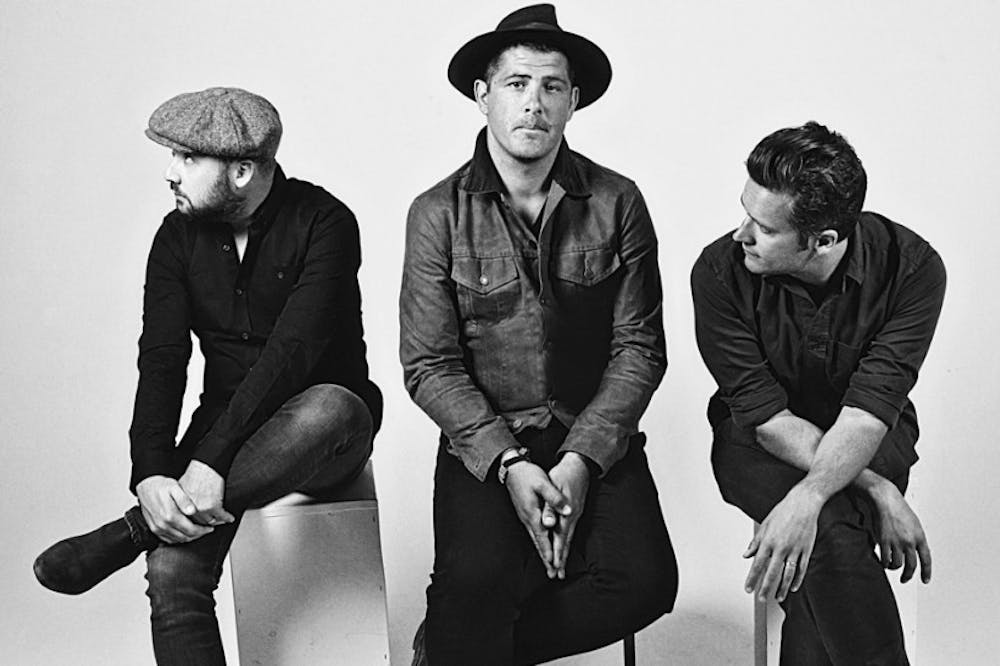Released: 2/4/2014
7/7 stars
They did it. We Are Augustines frontman Billy McCarthy overcame some of the worst personal tragedies one can endure, and along with multi-instrumentalist Eric Sanderson, created a tear-jerking indie rock album highlighting the emotional despair of these tragedies, and ending on notes of optimism and perseverance. The story that so desperately needed to be told had been told in Rise Ye Sunken Ships. So now what comes next for the duo? Add British drummer Rob Allen to the band? Great! Get rid of that silly "We Are" in the name? Sure. But now what? It's time for a walkabout.
Although self-titled, another fitting name for Augustine's sophomore LP would be that of standout track "Walkabout." The term walkabout refers to a rite-of-passage for Australian Aborigine men in which they wander the wilderness for months at a time on a spiritual journey of self-discovery. In essence, Augustines takes listeners on a similar journey, with the familiar blend of heartache and hopefulness that so accurately defines this band. "Walkabout" begins with a sorrowful McCarthy hitting high notes that were absent from the last record, and describing the feelings of losing oneself, "I walked out into the breeze to be quiet with the storms inside." Soon, a more uplifting blend of piano and acoustic guitar come in, and McCarthy returns to his usual howl that has rightfully earned him comparisons to Springsteen. As the song progresses faster, McCarthy croons, "it's over now, this walkabout. It's been so long, come home please," as a brilliant ensemble of strings, percussion, and backing vocals joins in on the ballad, having been methodically placed there by the band's gem, Eric Sanderson. "Walkabout" ends as McCarthy returns to the high notes, recognizing that the journey is over, the introspective war has been won, and it's time to come home.
If a simple listen or two of Augustine's first record didn't get fans hooked, it was the experience they were treated to at their live shows, which often left McCarthy without a voice, fans without hearing, and some venue workers with a good amount of sweat to mop off the stage. Making live performances even more powerful and memorable was kept in mind on Augustines, which includes sing-along anthems that would make even The Gaslight Anthem jealous. Songs like "Nothing To Lose But Your Head" and "This Ain't Me" feature choruses that just beckon for anyone within earshot to sing along at the top of their lungs. The exceptional percussion of Rob Allen on tracks such as "Don't You Look Back" and "Hold Onto Anything" will have listeners pounding their heads and clapping along as if they're making the rhythm themselves.
"Intro (I Touch Imaginary Hands)" sets the walkabout theme of the album as the first track on Augustines, while "Cruel City" evokes a tropical sound, revealing how McCarthy's trip to Kenya last year influenced his songwriting. "Weary Eyes," "Kid You're On Your Own", and "Now You Are Free" maintain a crowd-pleasing Augustines sound while helping to progress the story of persevering. "The Avenue" goes heavy on both strings and McCarthy's high notes, both of which are very welcomed additions to the band's second LP. Augustines is also highlighted by "Highway 1 Interlude," a meticulously constructed instrumental orchestrated by Sanderson.
After producing a sound on their first record that was compared to the likes of Bruce Springsteen and Arcade Fire, along with a live show that has been noted as U2-esque, Augustines needed to bring a sophomore album that was larger than life to the table. One that could make "album of the year" lists and propel the trio into huge venues that their sound commands to be in. Augustines has done exactly that.
They did it again.





